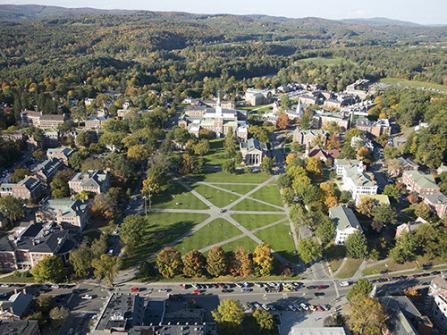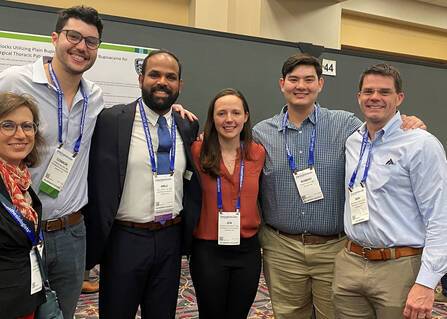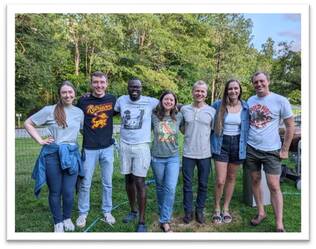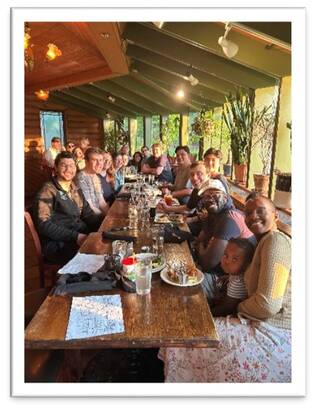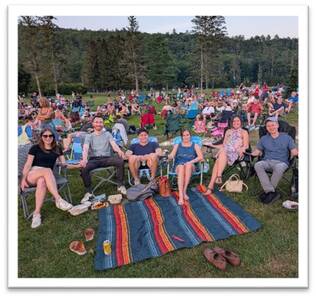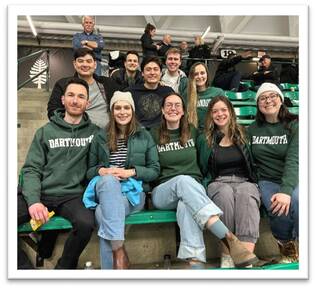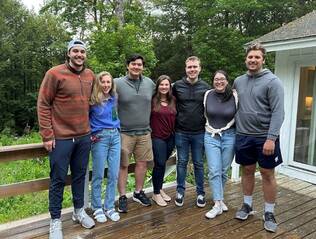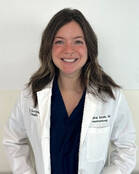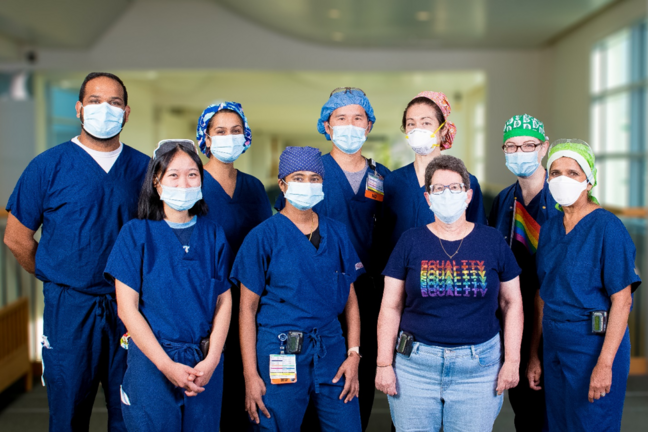Anesthesia Residency introduction
Anesthesia Residency Q&A
Welcome to Dartmouth Hitchcock Medical Center
We have everything that you would expect a major academic center to have, from inpatient wards, outpatient clinics, to a cardiac Cath lab. Dartmouth Hitchcock Medical Center is a beautiful institution and provides a welcoming collegial atmosphere.
Working at Dartmouth Hitchcock Medical Center
We offer benefits, including stipends, insurance, and assistance programs.
See also important and required GME policies to read prior to your interview:
Life in the Upper Valley
The Upper Connecticut River Valley area of central New Hampshire and Vermont includes the towns of Hanover and Lebanon, New Hampshire. Known as "The Upper Valley," this region attracts people from around the world for its scenic beauty.
The Upper Valley area offers a wide variety of cultural and recreational activities for people of all ages.
The cornerstone of our department's academic mission is training high-quality consultants in anesthesiology. Our 50 staff anesthesiologists come from diverse backgrounds and are committed to resident education. The department is directly responsible for the anesthetic management of more than 28,000 cases annually. We pursue the ideal of anesthesiology as the practice of perioperative medicine and maintain a dominant presence in the areas of critical care medicine and pain management in addition to practicing a wide spectrum of OR anesthesia.
Clinical Base Year (CBY)
Our program introduces learners to the role of the anesthesiologist as a perioperative physician. The clinical base year (CBY) curriculum for the upcoming academic year is composed of rotations in general internal medicine, cardiology, emergency medicine, general surgery, pediatrics, adult critical care medicine, blood banking, and palliative care. Interns work directly with our faculty during their clinical anesthesiology, perioperative medicine, ICU, CVCC, acute pain service, and echocardiography rotations.
Clinical anesthesia
From high-turnover cases at the Outpatient Surgery Center to emergent, high-risk cases in the main OR, our residents are challenged throughout their training. Without competition from fellows, our residents have first priority for complex pediatric, cardiothoracic and obstetric cases. Our case mix index (a reflection of patient diversity, clinical complexity and needed resources) is among the highest in the country (top 5%). Residents easily satisfy RRC minimum case requirements, typically by the end of the CA-2 year. The routine use of the resident case log report, updated on a monthly basis and appended to the daily case assignment sheet, has helped ensure that all residents complete training with an appropriate balance of case types and procedural experience.
Research
The department has an ongoing commitment to clinical and health services research. We encourage residents to participate actively in research projects, either ongoing or of their own design. We participate in ongoing multisite national clinical trials PCORI THRIVE, and PCORI My Anesthesia Choice. Led by Dr. Stacie Deiner, Vice Chair for research, faculty areas of interest and expertise include quality improvement, geriatrics, cognition, frailty, perioperative medicine, prehabilitation, technology and innovation, and research in education. We participate in the FAER summer student program and have supported fellows in the primary care T32 research training program. Residents in good clinical standing may apply for research time and mentorship for up to six months of protected research time. The department employs 3 full time research coordinators who are available to assist with regulatory and recruitment work for clinical studies, a PhD statistician, and a data analyst who can extract data from the electronic health record. Writing support and coaching is available as needed. We participate in the Multicenter Perioperative Outcomes Group (MPOG) and National Surgical Quality Improvement Program (NSQIP), which provide access to high resolution anesthesia and surgical data for projects.
Regional Block Program
The Regional Anesthesia Program at Dartmouth Hitchcock Medical Center has long been considered one of the best in the country with high volumes, internationally known faculty, and robust research activity. The block rotation is required in the CA-1 and CA-2 rotation and most residents elect to pursue additional experience in their senior year. The resident on rotation is free from other OR duties and is expected to identify potential candidates, evaluate the patient, and perform the regional block under faculty supervision. Our residents average more than 150 peripheral nerve blocks over the course of their training.
Perioperative echocardiography
We have an established perioperative echocardiography curriculum that covers both POCUS and TEE.
All residents (PGY-1 through 4) rotate at least annually on the Perioperative Echo rotation which gives them a protected block of time to best utilize these resources. As evidence of the strength of this training, many CA-3s have successfully passed the Basic Perioperative TEE certification examination, achieving testamur status.
Simulation
The use of simulator-based training plays a vital role in anesthesia resident training, teaching, and reinforcing critical skills in a safe environment. The department sponsors on-site Anesthesia Crisis Resource Management (ACRM) training using the space and resources of the Patient Safety and Training Center (PSTC), an 8,000 sq. ft. simulation complex at Dartmouth Hitchcock Medical Center. During the CA-1 year, residents participate in ACRM1, a half-day course focusing on problem identification and call-outs for the help of basic anesthesia situations using a computerized mannequin. ACRM2 for the CA-2 residents is a full-day course that emphasizes crisis management and team-building skills using the computerized mannequin in more complex anesthesia scenarios. ACRM3, a follow-up course for CA-3 residents, is intended to provide participants with the opportunity to review critical event management principles and practice their application in the simulated setting.
Transition to practice
The Transition to Practice rotation is focused on preparing CA-3 residents for their shift to independent practice. Residents function as "pre-tendings" while supervising associate providers and junior residents in the OR. The senior residents are also responsible for making OR assignments and take on added responsibilities of supervision and triage while "running the board". This rotation consistently receives excellent feedback from our residents who appreciate the opportunity to experience the nuances of independent practice in a protected environment.
Combined Anesthesiology-Preventive Medicine Residency
The Department of Anesthesiology offers a unique opportunity for anesthesia residents to earn a master's degree in public health from The Dartmouth Institute for Health Policy and Clinical Practice (TDI) in a combined program with the Leadership Preventive Medicine Residency.
Commitment to education
Laura M. Chiang, MD is the Vice Chair for Education within the Department of Anesthesiology and Perioperative Medicine. A graduate of Princeton University and Harvard Medical School, she completed an intern year in internal medicine at Earl K. Long LSU Medical Center in Louisiana and her anesthesiology residency at UAB where she served as chief resident. She then completed a fellowship in Critical Care Medicine here at Dartmouth Hitchcock Medical Center and joined the staff at Dartmouth Hitchcock Medical Center in 2015. She has previously served as the director of obstetric anesthesia and is currently the Co-Medical Director of the Surgical Intensive Care Unit. Her clinical interests include critical care, management of complex patients in the OR, and quality improvement within perioperative critical care. She thrives on teaching applied physiology as pertains to anesthesia and critical care and conveying an architecture for learners upon which to scaffold knowledge.
“My mission as Vice Chair for Education is to provide a curriculum which both supports and challenges our residents to become the strongest clinical anesthesiologists they can be, amassing a robust fund of physiologic and pharmacologic knowledge that is applied thoughtfully and artfully to each and every patient for whom they care. Our goal is not to have residents simply memorize facts or deliver an anesthetic; our goal is to develop clinical leaders who are true physicians, providing superior care for patients because of a powerful combination of clinical acumen, dedication, and critical thinking.”
Resident Wellness Initiative
Residency can be a stressful and demanding period of our medical training. Our Resident Wellness Initiative aims to enhance the lives of our residents to allow us to be our best selves both at the hospital and at home. The wellness program is supported and funded by the Department of Anesthesiology and led by a senior resident. Wellness has many definitions, but our focus is on “life satisfaction” to address both the personal and professional components.
At Dartmouth, our wellness curriculum includes activities that promote resilience, professionalism, team building, mindfulness and emotional, social, and financial wellness. Activities and resident dinners are planned on a monthly basis which allows us to come together as a resident community and celebrate our self-care. Our 2024-2025 year was a great success, and we are looking forward to the upcoming year!
Some wellness events we did last year:
- Summer: Local outdoor concert and good eats from food carts
- Fall: Pumpkin picking and hot apple cider at Riverview farm
- Winter: Dartmouth College hockey game with snacks from the concessions
- Spring: Meeting baby animals and tasting maple ice cream at Billing’s Farm
- Quarterly dinners at local restaurants, always a good hang
- Coffee and snacks on tap in the resident lounge
- Breakfast available at mandatory morning resident meetings
What our residents have to say about our wellness programming:
- “The wellness program has united residents and given me great assurance that our program is deeply invested in its residents.”
- “I’ve definitely noticed an improvement in morale among all the residents. Also, many of the events allow senior residents to interact with the CBYs.”
- “Gives me things to look forward to, makes mandatory events more enjoyable, promotes group bonding, and increases overall sense of satisfaction.”
- “The wellness program / additional funding definitely help foster more comradery in our program and made us feel more valued as residents.”
The Wellness Chief for the 2025-2026 academic year:
Natashia Smith, MD
Inclusiveness, Diversity and Equity in Anesthesia - Logical Strategies (IDEALS)
We are committed to fostering a strong community and a culture of belonging within our anesthesia department. Attendings, CRNAs and residents collaborate to celebrate, organize and support hospital, local and regional activities that foster a diverse community. Several new initiatives include developing quality improvement metrics to measure and quantify the perception of inclusion and belonging within the department. Over the course of the academic year, we design targeted initiatives to improve and maintain diversity and inclusion in anesthesia. Monthly minutes from the meetings also highlight events in the area that support diversity efforts in the upper valley. Do not hesitate to contact us for more details regarding these events and life in the Upper Valley.
A great place to live
Dartmouth Hitchcock Medical Center is located in the scenic Upper Valley, an area of Northern New England that stretches along the Connecticut River and includes the foothills of New Hampshire's White Mountains and the Green Mountains of Vermont. With ready access to the outdoors and major metropolitan areas (Boston 2 hours, Montreal 3 hours), this area is consistently recognized as an extraordinary place to live and work:
- Top 5 Safest State in 2024
- Best Small Town in America (Lebanon, Livability.com, 2015)
- Best Town finalist (Lebanon, Outdoor Magazine, 2015)
- Best College Town in America (Hanover, Movoto, 2014)
- Best Cities to Raise an Outdoor Kid (Lebanon, Backpacker.com, 2009)
- Best Places to Live (Hanover, Money Magazine, 2009, 2011)
A solid foundation
We remain committed to nurturing a dynamic environment that promotes the learning, teaching, and practice of all aspects of our specialty. Our trainees have enjoyed remarkable success in achieving certification from the American Board of Anesthesiology and have proven highly marketable following graduation. Given the extraordinary level of faculty commitment to resident education, our outstanding facilities, and increasingly diverse clinical caseload, our program will continue to be an innovator in the evolution of anesthesiology and perioperative medicine.
Program leadership
- Benjamin D. Morley, MD
Program Director
Anesthesiology Residency - Ellen Seiffert, MD
Associate Program Director
Anesthesiology Residency

